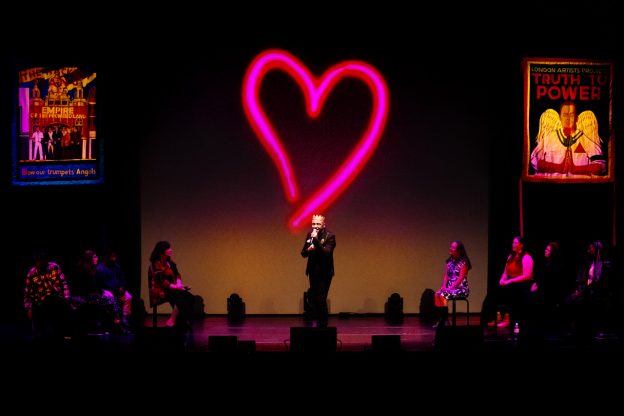Jeremy Goldstein of London Artists Projects reflects on how exploring his personal biography and family history led to the creation of an internationally lauded project, Truth to Power Café, and then to the newly launched venture, This Is Who I Am
Seven years ago I ventured forth into the Harold Pinter Archive at the British Library in London to read private letters between my late father Mick Goldstein and his best friends, poet Henry Woolf and Nobel Prize winning playwright Harold Pinter – who with Jimmy Law, Moishe Wernick and Ron Percival became known as the Hackney Gang.
Spurred on by theatre director Jen Heyes, I began a life-changing journey that would eventually result in the creation of our internationally acclaimed interdisciplinary performance event Truth to Power Café, and a new digital theatre project This Is Who I Am, which will open at the end of this month (April 2022) with British Council at the National Libraries in Singapore.
At the time I had no idea what I might find in those letters, and nor did I know that they would pave the way for my transition from producer to writer, performer, and artist.
I knew of their existence because my father had shown them to me with pride on a trip to Australia in 2012. Perfectly preserved in their original envelopes, stamps from the 1950s intact, these were long letters bound by their love of Beckett and passion for cricket. They were acquired by the British Library just before my father died in 2013, and remain on public record as part of the Pinter Archive.
Jump forward to 2015 and I had just re-established my long-time production company London Artists Projects (LAP) which I’d set up in 2002. The company, which folded for a time in 2010 due to a lack of funds, is now celebrating its twentieth anniversary. Genre-busting work which I’d struggled to produce for over a decade had finally come home to roost under the umbrella of LAP. Past lives and experiences – the people, places, projects, and memories that made up LAP’s back catalogue of artist projects – had finally been laid to rest. For the first time in my life, I was debt free. I didn’t owe anything to anyone, and the coast was clear for a new theatrical adventure, which I wanted to produce under the aegis of LAP mark II.
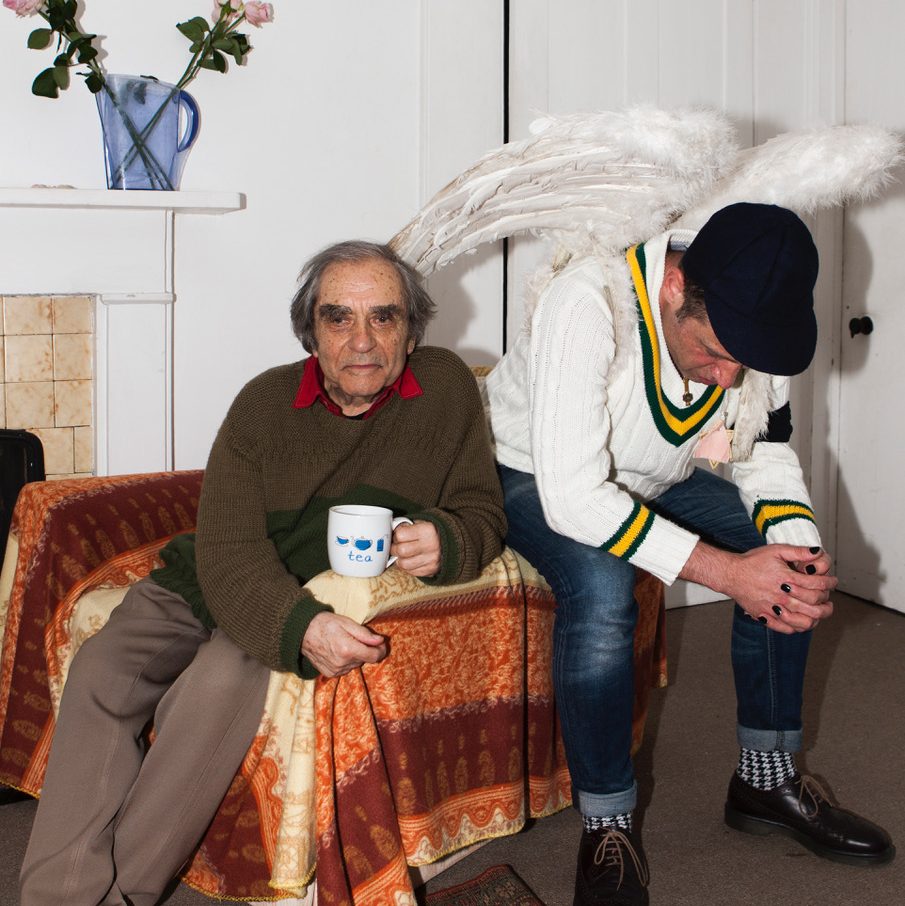
Photo: Darren Black
I remember my first official day at the British Library only too well. I arrived, like an immigrant at what felt like the border to an uncharted land. I was greeted by a lovely old queen from Brazil, and with a wink and a smile I was through and began to make my way to the Manuscripts Room.
On my way I stumbled upon the Treasures of the British Library exhibition. To my left were original scores from Handel, Beethoven, Elgar, and Debussy. In the corner was Jane Austen’s writing desk and next to that was the original manuscript for Nicholas Nickleby by Charles Dickens, and handwritten poems by Oscar Wilde. But the real find was exhibit No.19. Situated in a glass case in amongst handwritten lyrics by Lennon and McCartney (to ‘Help’, ‘Ticket to Ride’ and ‘A Hard Day’s Night’) lay a single letter with its own plaque:
No.19: Letter from Harold Pinter to Mick Goldstein, 1955:
‘In 2014, the British Library announced the acquisition of a collection of over 100 letters from Harold Pinter to two of his childhood friends, Mick Goldstein, and Henry Woolf. Written in Pinter’s late teens and twenties, the letters candidly discuss his early playwriting… and his interest in a new unknown writer – Samuel Beckett.’
The letter on display began and ended as their letters always did: ‘Dear Mick… love Harold’. Four words, written countless times, which now frame a sixty-year friendship defined by an enduring capacity for mateship, during which they maintained the intellectual excitement of their youth, and shared discoveries. In their later politically active years, they maintained their belief in speaking truth to power, and remained firmly on the side of the occupied and the disempowered and their allies. They also believed passionately in the existence of an independent media.
As I began to comb through the archive, I discovered the original typescript of Pinter’s one and only novel, The Dwarfs. The novel, which was written in the 1950s and eventually published in the 1990s, was described by Pinter’s biographer and former Guardian theatre critic Michael Billington as holding the key to all Pinter’s later plays. The protagonist, Len, is based on my father Mick. In one scene Len says, ‘I’ve never been able to look in the mirror and say this is who I am’. When I read that line for the first time, I couldn’t get it out of my head. It was all the evidence I needed of my father’s insecurities and lack of fulfilment that got expressed through our difficult relationship, in the form of the power he held over me for so long. There it was laid bare, the truth of his lived experience captured with pinpoint accuracy by his best friend, Harold Pinter.
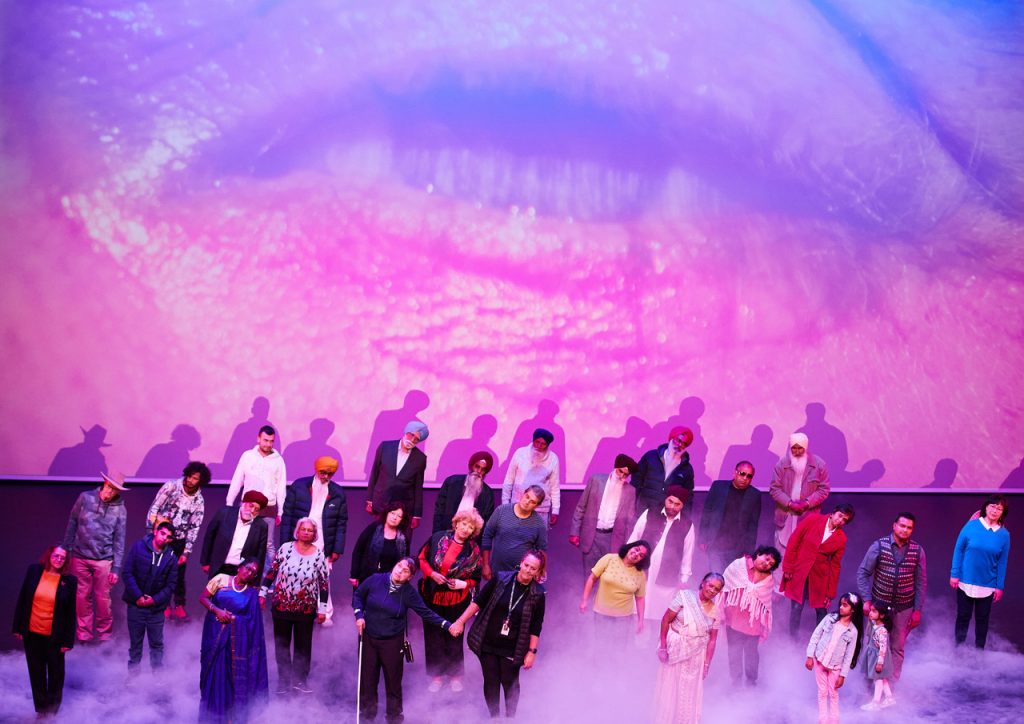
It’s an insight which did not escape the view of Sarah Schulman, celebrated US novelist and founder of the ACT UP Oral History Project in New York. I had brought Sarah to London in 2015 as part of a series of talks I curated for Penny Arcade’s Longing Lasts Longer at Soho Theatre, and again in 2019 with Dan Glass and ACT UP London (AIDS Coalition to Unleash Power). I had also attended the early meetings of the Melbourne chapter of ACT UP in the 1980s, and saw first-hand how the movement, which changed the world, made everyday people feel like heroes in their own lives.
Sarah, with her characteristic rigour, was able to take these insights one step further with an acute observation of the work, describing it as ‘a conscious transformation of history into opportunity’. In those few words Sarah enabled me to see that in the benevolent shadows of the Hackney Gang and ACT UP, I was using the truth and the pain of my lived experience, to enable others to express theirs. The cycle of my inherited trauma had been broken forever and now, seven years on, LAP and its signature project Truth to Power Café, developed and directed by Jen Heyes – who is Liverpool based and working-class – has become the crucible for nearly six hundred stories from people of all ages, experiences, and backgrounds in six different countries, to talk back to those that try to stop them.
The question at the heart of the project – ‘who has power over you and what do you want to say to them?’ – is conceived to challenge notions of power and give a voice to people who don’t normally have a chance to speak out. People from marginalised communities tend to want to talk about progressive change, whereas those with privilege and power want to maintain the status quo and have more power. For me personally, it’s often the most personal stories that I find the most effecting, especially from first-time speakers and those who are potentially the more vulnerable voices from within our midst. But above and beyond the politics, we at LAP remain resolute in our belief that everyone has their own unique story to tell, and all are plays-in-waiting.
In the UK alone, Jen and I have toured the show all through the north of England. We’ve gone out of our way to reach people and participants we often only ever see depicted in the films of Ken Loach. We find our participants in close collaboration with each of our venues. It’s a process which normally takes about three months to realise, and even then, with resources as they are, we only ever meet our participants on the day of each performance as part of a 90-minute photo call and rehearsal in advance of the 60-minute show.
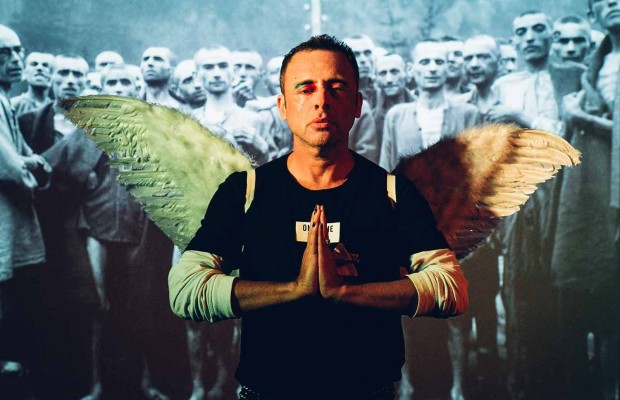
I’m also cast as a participant. I tell my story through a combination of memoir, image, film, music, and art. My story begins with the tale of the Hackney Gang, a celebration of Harold Pinter, Henry Woolf, and my father Mick Goldstein.
Bejewelled with the original poetry of Henry Woolf himself, the show opens in a post-war East London at a time when the Jewish avant-garde of the Hackney Gang discovered artists like Samuel Beckett and Louis Buñuel; and physically fought with fascists as the Holocaust still loomed, whilst those bombs that had eviscerated Nagasaki and Hiroshima seemed as present as if it were yesterday.
As my story unravels, we travel through time and space into a world of HIV+ and AIDS, and where I’m finally able to make sense of that power my father had over me when he was alive. The point at which love and empathy meets truth and reconciliation is the point at which I call our participants to the stage, some of whom have never spoken up in public before, let alone under lights in their local theatre. Participants’ voices are heard and understood through the political and philosophical beliefs of Harold Pinter and his Hackney Gang. In the eyes of our audiences – who largely comprise friends, family, and allies – they have become empowered experts on their own lives, and people to look up to in their own communities.
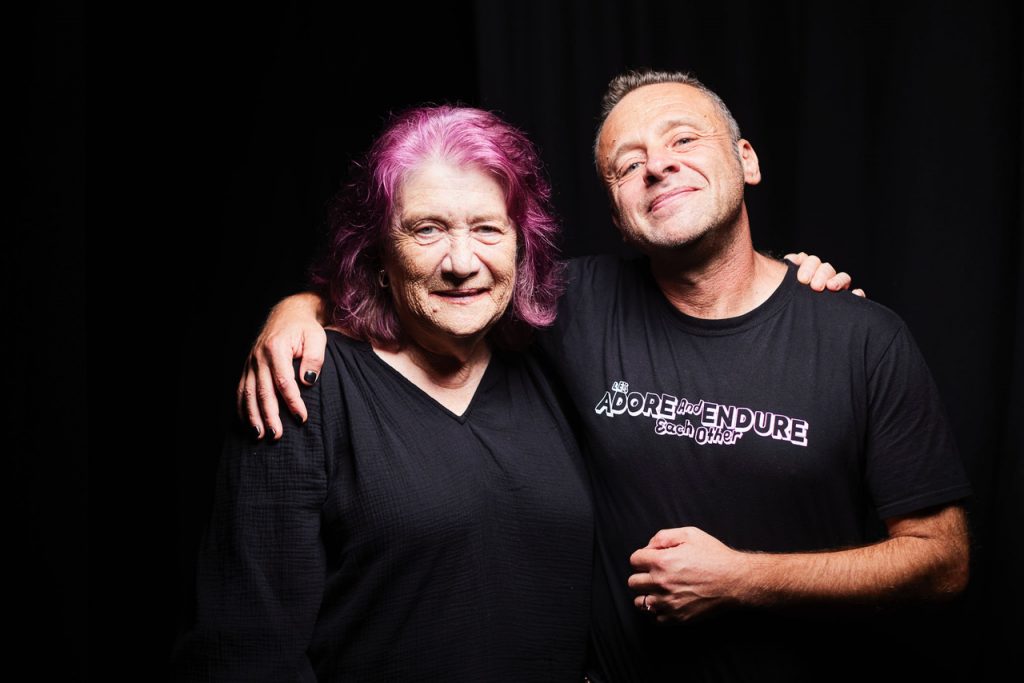
In October 2020, as the Covid-19 pandemic once again worsened in the UK, I flew myself to Sydney to be with my mother, Beverley. On arrival, I was in hotel quarantine for two weeks. It was here I oversaw the Singapore premiere of our digital theatre adaptation as part of the city’s new Power Play Festival. The film, which had been co-created with Montgomery College Cultural Arts Centre in USA, was one of four finalists for the 2021 Offie Award for Innovation. In Singapore it was seen by Dr Sarah Meisch Lionetto, Director of Arts and Creative Industries for British Council, who would later commission our new digital theatre project, This Is Who I Am. Set in a world beyond our own, eight differently abled artists in the UK and Singapore imagine a world designed for everyone, from the truth of their lived experience.
Also, during quarantine, I contacted Robert Love, the legendary Australian producer and former artistic director of Riverside Theatres in Western Sydney. Robert championed the project in Australia with three performances at Riverside followed by a fantastically successful tour during which we opened MELT Festival of Queer Arts and Culture at Brisbane Powerhouse, celebrated our fortieth performance event in style at Adelaide Festival Centre, and presented short digital seasons at Blacktown Arts in Sydney, and at Bunjil Place in Melbourne as part of City of Casey Ageing Positive Festival.
The Australian tour brought into focus the project’s capacity to capture social history and gave poignant political expression to lived experiences in ways I hadn’t seen before. The Riverside Theatres season opened with our first ever indigenous theatre event curated with Steven Ross. The event included Maljangapa mother and son participants Keith and Cleonie Quayle, speaking passionately from the truth of their lived experience. Cleonie spoke as a member of Australia’s stolen generation, and her son Keith’s unforgettable speech addressed Aboriginal deaths in custody, envisioning ‘a future without bars, and a world where we take ownership over societal wrong doings’. The following night, my own mother Beverley took part as a participant, recounting her life through the power of music.
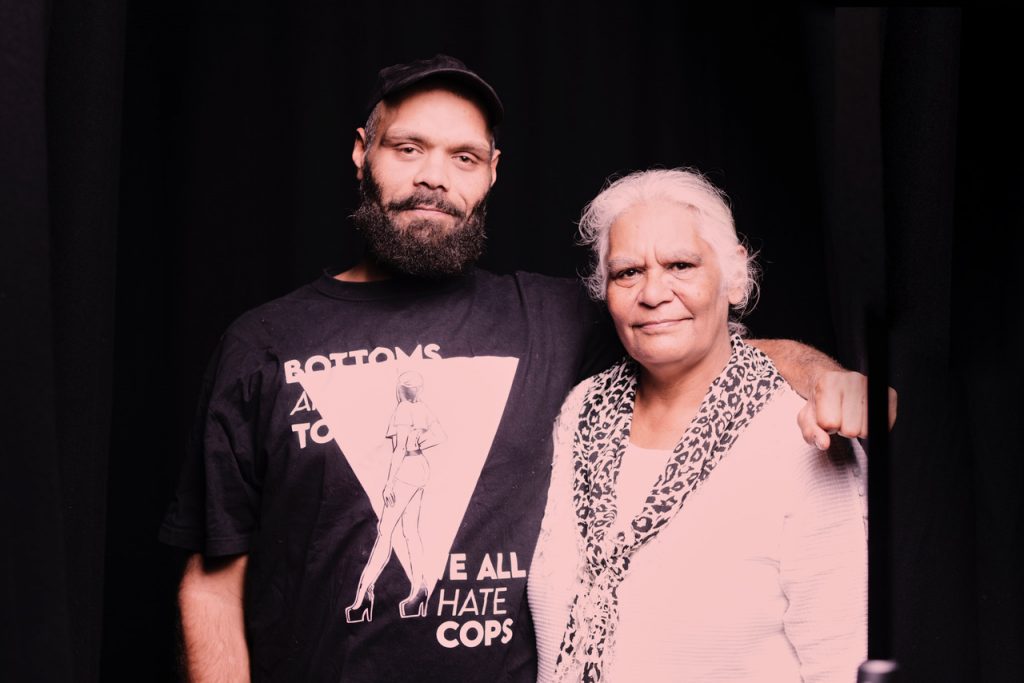
In Brisbane, we heard from Brian Day OAM. Brian was one of Australia’s earliest campaigners for LGBTQ+ rights, co-founding the Brisbane branch of Camp (Campaign Against Moral Persecution) in 1971, and in 1984, at a time when HIV+ and AIDS first hit the community, he was vice-president and spokesman for the Queensland AIDS Committee. In Adelaide, Kyron Weetra, who has Narrungan ancestry, gave an impassioned takedown of colonialism, and the gaping wound at the heart of Australian national identity. Kyron was followed by Tom Webster and Anjali Beames, two young climate activists named in a class action suing the federal Environment Minister over ‘duty of care’ to block the approval of a coal mine. To thunderous applause, from a packed Adelaide Festival Centre theatre, they urgently proclaimed ‘We tell those in power, they will be held accountable’. At the newly built arts centre Bunjil Place in Melbourne, I met a community of forty everyday people eager to tell their emotive stories of displacement and migration. In the 800-seat state-of-the-art Lyric Theatre, I was able to direct my own filmic scenes for the first time. This included a spectacular rose petal drop, which I conceived to elicit authentic feelings of freedom and liberation.
However, during the making of these events, Covid had come to badly bite Australia, and we were thrown into a 100-day Sydney lockdown with less than a day’s notice. How we managed to dodge those bullets I will never know, but despite the upheavals, the Australian tour remains a highlight of the project to-date. Our Adelaide Festival Centre show and digital theatre events in Blacktown opened the British Council UK/Australia Season, and our Bunjil Place digital theatre edition – rose petal drop and all – is to my mind the definitive digital theatre edition of the show, and was critically acclaimed as part of Melbourne Fringe Arts Festival.
By October 2021, the Sydney lockdown had ended and I was back in London. Soon after, Henry Woolf died, aged 91. In his last years, we had become great friends, and like my own father Mick, he was full of pride for their Hackney Gang and the love they shared for their great friend Harold. I know for a fact Henry was thrilled with the global success of Truth to Power Café, and so it was from the heart that we were able to dedicate our most recent performances to him as part of the launch event (in February 2022) for Rotherham Children’s Capital of Culture 2025. These events were commissioned by The Space who live-streamed the show with young participants from Rotherham. Working with them, and the dedication to Henry, filled me with optimism and hope for the future. If only our politicians could do the same!
Seven years an immigrant into this uncharted land, I am broke but happy, in the knowledge the journey has been worth it.
Such is the power of art, I have learnt that the dead may well be invisible, but they are not absent – they live on, inside of us. It’s a life lesson which enabled me to repair the damaged relationship between my father and me, and I am liberated as a result. As Dr Robert Reid said of our Bunjil Place edition in Melbourne, ‘it’s not just the memories, but the legacy they leave us with, which is alive and powerful, consciously and unconsciously giving shape to who we are, and what we think we can be’.
Despite our meagre resources, I look on in wonder at what LAP has achieved in its 20-year history. As the founder of an artist-led company, I have finally created our own unique theatrical genre of ‘truth to power theatre’ from the truth of my lived experience. For LAP to be doing what Dr Reid describes as ‘the most important work that theatre can – giving voice to those who are expected, and expect too, remain silent’ is incredibly exciting.
In the words of Mark Taylor-Batty, Senior Lecturer in Theatre Studies at University of Leeds, and Leader of the AHRC Harold Pinter: Histories and Legacies Project:
‘What connects Truth to Power Café and This Is Who I Am is an ambition to understand and project not just what tears people apart, but what energies and self-awareness might finally bind them back together. Where Pinter’s work presented rigorous warnings of how our tendencies to betrayal and personal isolation cause rifts between friends, lovers, and communities, Truth to Power Café, and This Is Who I Am, seek to offer audiences a sense of their own agencies in repairing and recovering loss and identity. Ultimately, these two works are about love – which though never easy, is ultimately our only answer.’
Or, as Pinter himself once wrote in a letter to Henry Woolf: ‘The theatre is one of the good things of civilisation.’
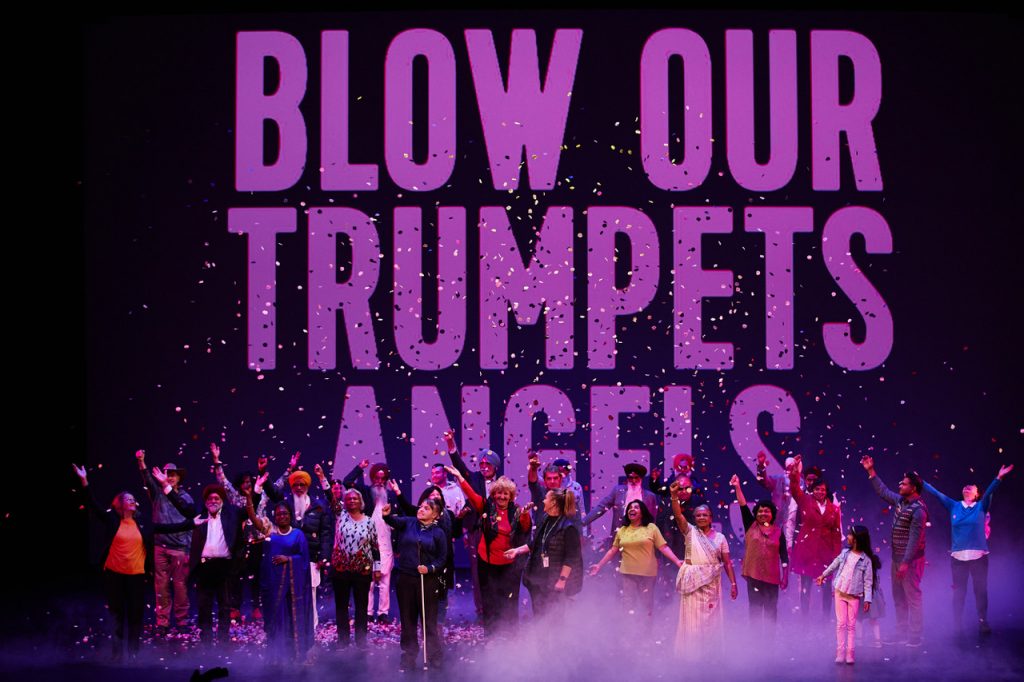
Featured image (top of page): Jeremy Goldstein performing in Truth to Power Café as it opens 2021 MELT Festival of Queer Arts and Culture at Brisbane Powerhouse, Australia. Photo: Kate Holmes
Jeremy Goldstein is the founder and director of London Artists Projects and an HIV+ activist with ACT UP London. He is the creator of Truth to Power Café and, with Jen Heyes, co-creator of This Is Who I Am.
www.londonartistsprojects.co.uk
This Is Who I Am will be screened in person at selected National Libraries in Singapore with British Council and be available to view online for free from 1 June 2022. thisiswhoiam.online
To mark the opening of This Is Who I Am, all digital theatre editions of Truth to Power Café, including the recent live streamed event commissioned by The Space, will become available to watch free at the point of access from truthtopower.co.uk
Follow British Council Singapore or London Artists Projects socials for the release date of This Is Who I Am
Facebook: @BritishCouncilSingapore or @londonartistsprojects.thisiswhoiam
Twitter: @sgBritish
Youtube: britishcouncilsg
Vimeo: londonartistsprojects
Websites: www.britishcouncil.org | www.londonartistsprojects.co.uk

